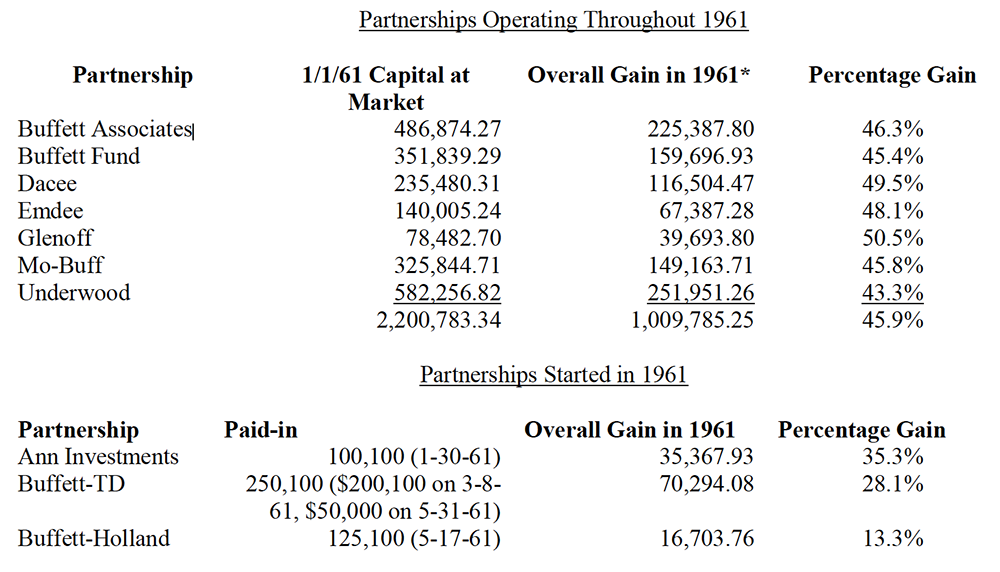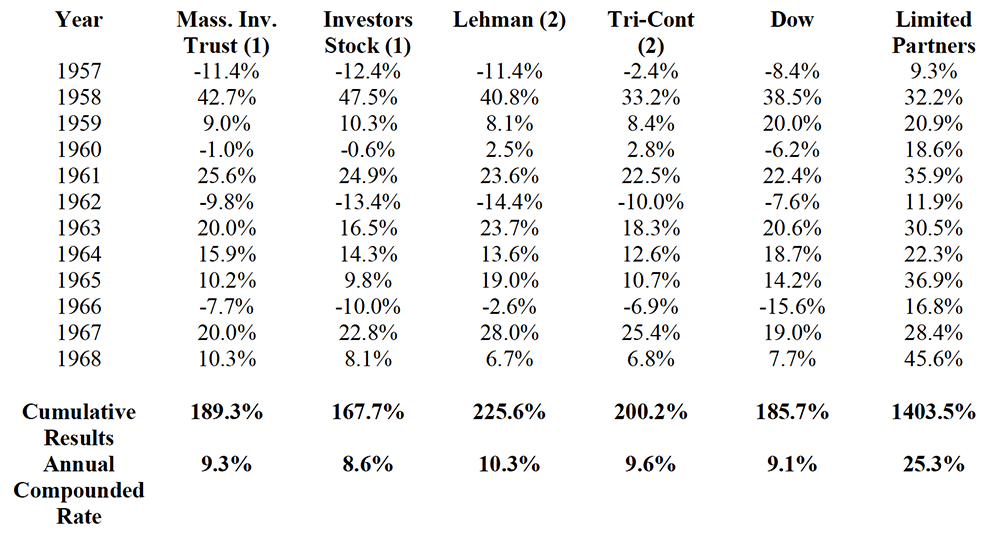
After 12 years of crushing Lehman Brothers, the Massachusetts Trust, and the Dow Industrial Average, Warren Buffett retired from investing in May 1969, never to be heard from again.
The first half is completely true. The second, true as of the end of 1969. Learning about both of those facts has dropped me down a fascinating rabbit hole of corporate history and Buffett lore that I’ll summarize and share as it all unfolds to me.
In trying to better understand the what, why, and how of Berkshire Hathaway I turned to the source, Buffett himself. His annual letters to shareholders are legendary, but what is rarely spoken about is the fact that he didn’t start off as CEO of Berkshire Hathaway. His career began in the 1956 with a series of investment partnerships. And he wrote letters to those investors too (the highlighting is mine).
So not only did Warren Buffett not originally conceive of an investment holding company, he hadn’t even originally started with a single investment trust, but instead what we’d today call a series is 1-year rolling funds. The 1962 lists all the partnerships and talks about the complexity in managing separate funds, and in 1962 these were all consolidated into Buffett Partnership Ltd.

Also in 1962 Buffett started comparing the results of his investments with four of the largest investment trusts (forerunners of mutual funds): Massachusetts Investors Trust has net assets of about $1.8 billion; Investors Stock Fund about $1 billion; Tri -Continental Corporation about $ .5 billion; and Lehman Corporation about $350 million; or a total of over $3.5 billion.

Back to the opening statement, “Limited Partners” in the rightmost column is the net return to Buffett’s investors. He averaged a 25% compounded rate of return from 1957 through 1969, while the market as a whole averaged just 9.1%. He was the “Oracle of Omaha” from the start.
But then, out of no where in the May 1969 letter, he retired: … before yearend. I intend to give all limited partners the required formal notice of my intention to retire.
There are 22 pages of letters after that statement, most of which talks about the details in unwinding the partnership. There are a few mentions of our two controlled companies (Diversified Retailing Company Inc. and Berkshire Hathaway Inc.) and one other small “restricted” holding, but those are both just minor details which, at the time, must have been heartbreaking news to the investors who had (wisely) trusted with their money.
Some of you are going to ask, “What do you plan to do?” I don’t have an answer to that question. I do know that when I am 60, I should be attempting to achieve different personal goals than those which had priority at age 20. Therefore, unless I now divorce myself from the activity that has consumed virtually all oyf my time and energies during the first eighteen years of my adult life, I am unlikely to develop activities that will be appropriate to new circumstances in subsequent years.
In 1969, Warren Buffett was just 39 years old. Soon to be retired, with no plans on what to do next.
How did he get from there to CEO of Berkshire Hathaway? I have paper copies of the 1965-2014 shareholder letters waiting to be read (and then summarized) for answers. But what intrigues me even more is the question, who was behind Berkshire Hathaway’s early acquisitions, as it was just a textile company back in 1965 when that year’s letter announced little more than: The partnership owns a controlling interest in Berkshire Hathaway Inc., a publicly-traded security.
One clue is in the details of the partnership wind down, when Buffett stated that: At yearend, [Buffett Partnerships Ltd] will own 800,000 of 1,000,000 shares outstanding of Diversified Retailing Company. First Manhattan Company and Wheeler, Munger & Company will each own 100,000 shares. That is the first and only time the name Munger shows up in this set of letters. But the partnership only owned 70% of Berkshire Hathaway, and I won’t be a bit surprised to find Munger & Company in that ownership group too, and I look forward to seeing whether the 1965 Berkshire Hathaway letter is written by Warren Buffett.
Odd to leave a story of history on a cliffhanger, but that is where it sits for me too…














